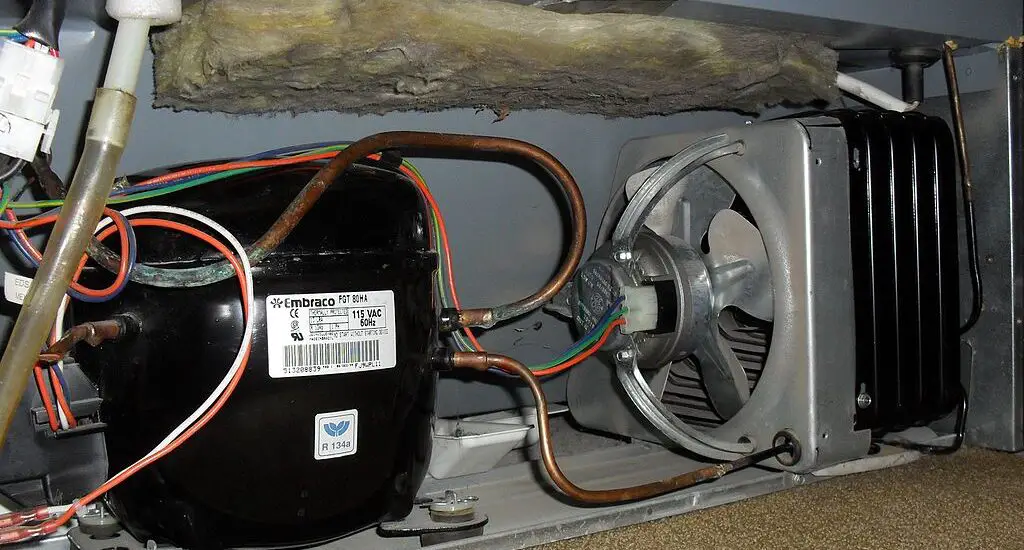“How much oil in a fridge compressor?” We’re sure this is not a question that has popped into your head severally. However, we can read your mind and tell you that you’re currently thinking about it. That’s why you’re reading this piece. Well, fridge compressors typically contain between 3 to 6 ounces of oil. This crucial component lubricates the compressor, ensuring smooth and efficient operation. But hey, there’s more to it, so stick around!

Table of Contents
Overview
Let’s crack this open, shall we? To put it simply, fridge compressors are the heart of your refrigerator. And what does the heart need to function correctly? Blood, right? In a fridge compressor, oil plays a similar role to our blood – lubricating and cooling the compressor’s internal parts. This ‘blood’ – the oil – helps the fridge compressor beat without a hitch.
Importance of Oil in a Fridge Compressor
Imagine your bicycle without any oil on the chain. It would creak, moan, and eventually, it would wear out much quicker, right? Similarly, oil in a fridge compressor reduces friction, prevents overheating, and maximizes the compressor’s lifespan.
Types of Fridge Compressors and Oil Requirements
Different strokes for different folks – the same applies to fridge compressors. Each type has its own specific oil requirements. You didn’t think it was going to be that easy, did you?
Reciprocating Compressor
The old faithful reciprocating compressor, with its back-and-forth piston action, typically requires around 3 to 4 ounces of oil. It’s not a hard and fast rule, but a good ballpark figure to start with.
Rotary Compressor
On the other hand, rotary compressors, with their rotating motion, need a tad more oil – around 4 to 5 ounces. But remember, these are just average figures. It’s like trying to guess the weight of every cat in the world – you’re bound to be a little off!
Scroll Compressor
Scroll compressors are a bit more complicated, with their twisting and turning. But don’t worry, their oil requirements aren’t that confusing – they typically need about 3 to 4 ounces of oil.
Centrifugal Compressor
Centrifugal compressors, the ’round and round’ guys, use about 5 to 6 ounces of oil on average. Kinda like spinning a top, right? You need to keep it well-oiled to keep it spinning without a hitch.
Check out these other related articles…
What is Inverter Compressor in Refrigerator? An Easy Guide
Disadvantages of Inverter Compressor Refrigerator: 411 Guide
Compressor Valve Types: Your Detailed 411 Guide
Compressor Valve Plate Failure: Causes & Proven Solutions
Refrigerator Compressor Wattage: Your Ultimate 411
Refrigerator Compressor Running but not Pumping: 3 Quick Fixes
Factors Determining Oil Quantity in a Fridge Compressor
What determines how much oil a compressor needs? It’s not as simple as saying, ‘one size fits all.’ Many factors can change this, just like how your favorite jacket might not fit your buddy.
Compressor Size
It’s not rocket science – a larger compressor will typically need more oil than a smaller one. It’s just like a bigger engine in a car would require more oil than a smaller engine.
Small Compressors
So, for small compressors, you’re generally looking at around 3 ounces of oil. You don’t want to overdo it, as too much oil can cause problems. It’s like trying to fill a teacup with a gallon of tea.
Large Compressors
On the flip side, larger compressors will need a bit more oil – somewhere in the range of 5 to 6 ounces. It’s like pouring a gallon of tea into a teapot – more space, more tea!
Compressor Brand and Model
Different brands and models have different oil requirements. It’s just like how different car manufacturers recommend different types of oil for their engines. So, always check the manufacturer’s specifications.
Age and Condition of the Compressor
The age and condition of the compressor also influence the amount of oil it needs. A brand-new compressor will have different needs compared to an old, worn-out one. It’s like you and me – as we age, our needs change, right?
How to Determine the Oil Level in Your Fridge Compressor
You can’t just open your compressor and peek inside, can you? Well, here are some clues to help you determine if your compressor might be running low on oil.
Signs of Low Oil Levels
If your compressor is making a strange noise, overheating, or not cooling your fridge efficiently, it might be low on oil. It’s like driving a car with low engine oil – you’ll see signs before it completely breaks down.
Checking Oil Levels
Checking the oil level in a fridge compressor is a bit of a technical job and is often best left to a professional. But if you’re handy with tools and familiar with safety procedures, you can check it yourself. Make sure to follow your manufacturer’s instructions closely.
What Type of Oil to Use in a Fridge Compressor
Not all oils are created equal, just like not all pizzas are created equal. You want to use a specific type of oil in your fridge compressor to keep it humming smoothly. Manufacturers usually recommend a specific type of oil, often a synthetic one, which has excellent temperature and friction resistance.